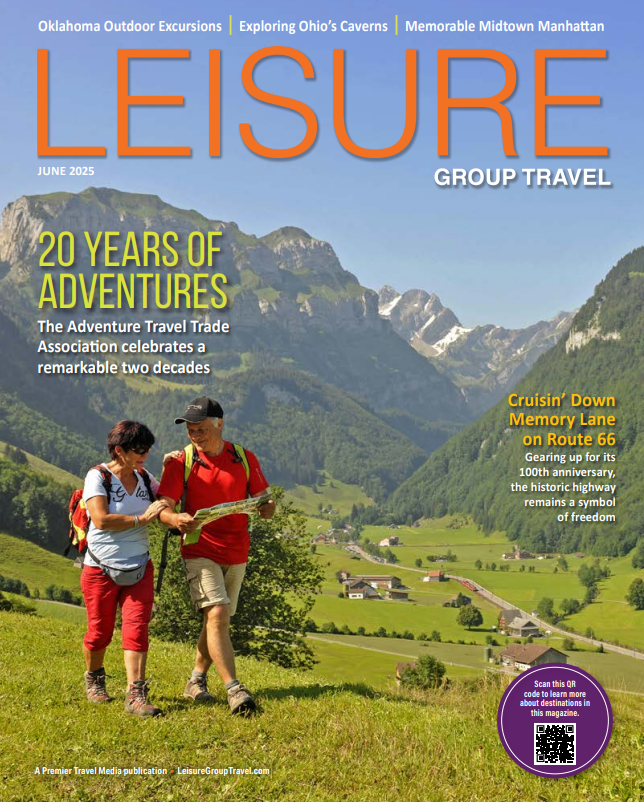Marketing expert Mike Marchev offers tips to tour planners, a five-part strategy that will set the stage for success
It amazes me how straightforward, logical and fundamental approaches to solving problems often take years to settle in the adult brain. This question is only superseded by why it took man so long to put wheels on his luggage.
I recently stumbled upon a formula that not only makes sense, but I am betting will make this year your absolute best year to date when it comes to selling group travel space. Regardless of your current practices or how successful these efforts have been to date, try to internalize the logic behind my recommendations.
Here are few facts to help set the stage for group travel success:
- Selling without a list is like shooting clay pigeons in the dark.
- Consumers are not at a loss for options. They have a million of them. Why choose you?
- People do not like to be sold but they do like to make buying decisions.
- People are influenced by identifiable “mental triggers.”
- People digest small chunks of information more easily than large data dumps.
- People are people … and therefore are quite unpredictable.
The steps to selling out your next group movement consist of just that … steps. When taken one at a time you will find your successes will exceed your “nice tries.”
Step One: Build and define your target list of participants.
Your list of prospects is the most important piece of real estate you own. In truth, it is your business. It is not just a bunch of meaningless names, but rather a document comprised of real people who have shown a genuine interest in your service. It is golden. It is the key to the vault. You need to (and must) continue to build your working list daily.
Step Two: Ask for opinions.
One of the first lessons I learned years ago in professional salesmanship is that people have a deep-rooted tendency to endorse their own ideas. It is important therefore to allow prospects to have a voice. You can accomplish this task with a simple questionnaire or by soliciting the ideas of the prospects themselves. It is truly amazing how much useful information you can acquire by simply asking for your prospect’s opinion.
Step Three: Distribute three pieces of valuable information to your targeted audience.
There is no shortage of information available in the universe. A prospect’s knee-jerk defense is to protect himself from useless information so as not to clog their already jammed brain cells. The way to circumvent this roadblock is to piece-meal meaningful information in small tolerable chunks. This can be referred to as a Sideways Sales Message. It delivers the message in its entirety, but in three bite-size chunks … during three distinct delivery points. We spoon-feed our audience little-by-little in an effort to aid comprehension and to better ensure message internalization. This strategy will prove to be both effective and appreciated.
Step Four: Launch your program with a defined “scarcity”
The Launch. Now that you have set the stage, it is time to announce to your audience the availability of your group movement. This day has been long anticipated and those who have a genuine interest in joining in the fun will respond accordingly. It is important that you refrain from all signs of outdated marketing hype, but it is a good idea if you can position your offer making it appear that the potential participant does not have all the time in the world to make a decision. The concept of “scarcity” is still effective when trying to get people to make a decision.
Step Five: Continue promoting after you analyze your short-term results.
Track Your Progress. Although your designated time limit may have come and gone, you can still continue to promote your group movement. Pay attention to what is working and what may be lacking in effectiveness. Dare I say “analyze” your progress and take detailed notes on how you can improve upon your next group launch.
Consumers are looking for connection, reliability and somebody they can trust. This is where a little knowledge and understanding of “mental triggers” comes into play. It is a well-recognized fact that people make buying decisions based on emotion. They then justify their decision with logic. Mental triggers play a pivotal role when deciding on a particular buying decision. In this article I will touch on three such triggers:
Authority. We have come to rely on those in authority. We respect their input and more often than not, follow their advice. Therefore, it behooves you to do what is necessary to become an authority figure. This is done by writing articles on your subject matter and by offering to speak on your topic of interest. In a true sense, you will become the leader of your group. You will be perceived as the one-in-the-know based on your communication skills (speaking and writing).
Reciprocity. Simply stated, people feel obligated to return kind favors. If you give me a present, I feel that it is only proper to respond in like fashion. If you provide me with valuable information with no strings attached or hidden agenda, more often than not I will be looking for opportunities to return the service.
Trust. Trust takes time and must be earned. Therefore, it is in your best interest to consistently be looking for ways to establish trust while consciously avoiding behaviors that will negatively affect your relationships. Each time we make contact with our clients/prospects we must have something valuable to say, explain or offer.
Travel options are a dime a dozen and selling group space will continue to be a formidable task as consumers become more knowledgeable and the options continue to accumulate. As the New Year unfolds, the winning organization will learn how to refrain from playing “me-too … only-better,” and focus on building itineraries tailored to their specific groups. By adhering to this five-step strategy you will find your group movements filling more rapidly with more people who are eager to let the good times roll.






